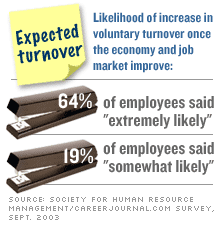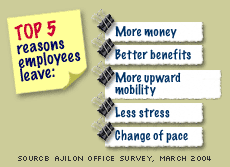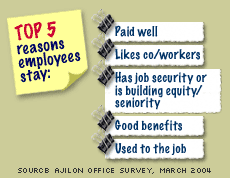NEW YORK (CNN/Money) – Back in 2003, various surveys predicted that as soon as the labor market improved, a high percentage of employees would be rushing the exits to find new jobs.

After all, the recession combined with heavy layoffs left many employed folks playing Cinderella for their employers: doing even more work with fewer resources and often for less compensation.
Well, there have been some promising signs of improvement on the jobs front lately. Over 330,000 jobs were created in March, the biggest one-month jump in four years; a higher-than-expected 288,000 jobs were created in April; and employers have said they expect hiring to increase in the second quarter.
So, are workers singing a collective refrain of "Take this job and shove it?"
Not exactly, or at least not yet.

But there is anecdotal evidence to suggest that employees have started to sniff around for new opportunities.
Calls to Ajilon Professional Staffing, for instance, have increased in the past couple of months compared not only to the same period last year but to the past two quarters.
"With unemployment decreasing, our candidate flow is increasing. Fundamentally, that should be going the other way," said Neil Lebovits, the company's president and chief operating officer. That is, normally you might expect there to be fewer candidates when there are fewer people out of work. That there are more implies people with jobs are looking, too.
Spherion, another large staffing firm, has also seen a rise relative to last year in visits to its job boards, replies to its advertisements and returned phone calls to its recruiters, said Spherion president Robert Morgan.

And recruiting for senior executives has been much brisker since the second half of 2003. "We saw a broad increase in executive hiring," said Joseph Daniel McCool, editor of Executive Recruiter News.
Still, it's not as if the most senior people are huge risk takers when it comes to making a move, said Jay Gaines, CEO of Jay Gaines & Co., which places executives in the financial services industry. "The people who have risen to power (in one company) appear to be less apt to give that up than they were five or six years ago."
Sign of things to come?
Stacey Piefer, a senior account executive specializing in human resource issues at a PR firm, just landed a new job at an advertising agency.
Even though she was looking for a new job for a year, 2003 was a non-starter. "There weren't even opportunities to apply for," she said. "You kept throwing the bait out, but the fish just weren't there."
Not so the past four months. During that period, she got four or five interviews and two job offers.
What's more, the interview process from start-to-finish for the job she accepted was just under two weeks. "I don't know if it was the right place or the right time. It was just a fit," Piefer said, who noted that friends looking for similar jobs are still having more protracted experiences.
Why some may jump ship
Among the candidates contacting Ajilon, their reasons for wanting to leaving a job are usually stated as money and benefits. But underlying that message, Lebovits believes, is exhaustion and a feeling of being underappreciated.
"They're overworked," he said. "They're not feeling the love."
| RELATED ARTICLES
|

|
|
|
|
While money was one reason Piefer started looking for a new job, it didn't top her list. Professional and personal reasons took precedence.
She wanted more work-life balance – in her new post, she can telecommute after three months. She wanted a more liberal vacation schedule. And she wanted greater opportunity for advancement than she currently had.
That squares with what Spherion's Morgan says are among the key reasons lots of employees want new jobs. They're also aware that big pay jumps aren't as easy to come by, he said, so there have to be other compelling reasons to make a move.
Who's got the best chance?
Even though job-search inquiries appear to be on the rise, no one is claiming this is a job-hopper's market or even a weak cousin of the booming job market in the late 1990s.
If you assume the grass will be greener elsewhere -- the dirty secret is it isn't always -- Spherion's Morgan recommends that you evaluate why you want to leave your job and make sure you can't get what you want where you are.
If you feel underpaid, have a frank conversation with your manager, he suggested. And calculate all the pros and cons of your job – not just wages, but career advancement opportunities, benefits, psychic income and work-life balance issues.
And if you want to make a change, assess your market value.
"If you're good ... you have nothing to lose by looking for the right opportunity. If you're okay – not overly marketable – stay there. If you're top-tier, you'll find a job anywhere," Lebovits said.

|

